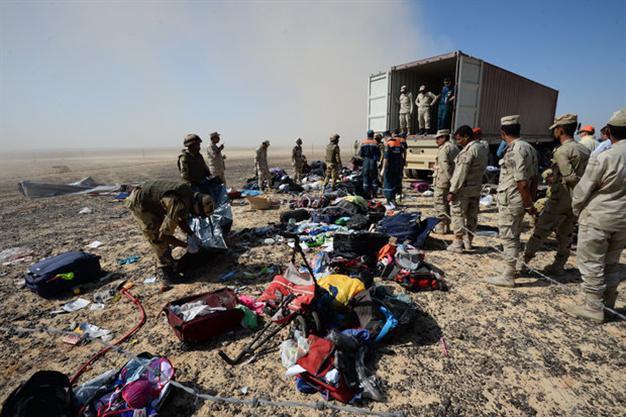Investigators ‘90 percent sure’ bomb downed Russian flight in Egypt
CAIRO

AP photo
Investigators of the Russian plane crash in Egypt are “90 percent sure” the noise heard in the final second of a cockpit recording was an explosion caused by a bomb, a member of the investigation team told Reuters Nov. 8, as countries increased their efforts to get their stranded citizens out of Egypt.“The indications and analysis so far of the sound on the black box indicate it was a bomb,” said an Egyptian investigation team member, who asked not to be named due to sensitivities. “We are 90 percent sure it was a bomb.”
Asked to explain the missing 10 percent, the investigator said: “I can’t discuss this now.”
Islamic State of Iraq and the Levant (ISIL) militants fighting security forces in Egypt’s Sinai Peninsula have said they brought down the Airbus A321, which crashed 23 minutes after taking off from the resort of Sharm al-Sheikh a week ago en route to St. Petersburg, killing all 224 passengers.
The crash prompted airliners to cancel their scheduled flight to Sharm al-Sheikh. Turkish Airlines (THY) in a statement yesterday said all flights to the resort until Nov. 16 have been canceled and a “plan for the evacuation of the passengers who are still at Sharm El Sheikh will be shared later.”
Russian Deputy Prime Minister Arkady Dvorkovich told reporters at a Moscow airport Nov. 8 that some 11,000 Russian tourists had been repatriated in the previous 24 hours, AFP reported.
“Today is the busiest day in this sense,” he said, adding that more people were set to return home later Nov. 8.
The Kremlin has insisted the decision to suspend flights does not mean Moscow believes the crash was caused by a deliberate attack.
But Dvorkovich said Russia was sending experts to inspect Egypt’s airports to see if security needed to be beefed up there.
Britain has also started flying out some of the 20,000 of its nationals estimated to have been in Sharm el-Sheikh at the time of the crash.
A British official said on Nov. 7 it could take 10 days for all British tourists to be flown home.
Britain’s foreign minister yesterday said the government would push for higher security at foreign airports in risky areas even if it meant extra delays for passengers.
“What we’ve got to do is ensure that... airport security reflects local conditions,” Philip Hammond told the BBC.
“Where there’s a local higher threat, that will mean higher levels of security are required and that may mean additional costs and may mean additional delays at airports.”
Efforts will be focused on areas where ISIL militants are known to operate if news reports are confirmed that they were behind the crash.
“If this turns out to be a device planted by an ISIL operative, or by somebody inspired by ISIL, then clearly we will have to look again at the level of security we expect to see in airports in areas where ISIL is active,” Hammond said.
ISIL militants fighting security forces in Egypt’s Sinai Peninsula have said they brought down the aircraft as revenge for Russian air strikes against Islamist fighters in Syria, where ISIL controls large areas in the east and north of the country. They said they would eventually tell the world how they carried out the attack.
If the group was responsible, it would have carried out one of the highest profile killings since al-Qaeda flew passenger planes into New York’s World Trade Center in September 2001.
On Nov. 7, security officials said Egypt was checking video footage at Sharm al-Sheikh airport for any suspicious activity linked to the crash, the clearest sign yet that Cairo suspects it could have been targeted by militants.
















